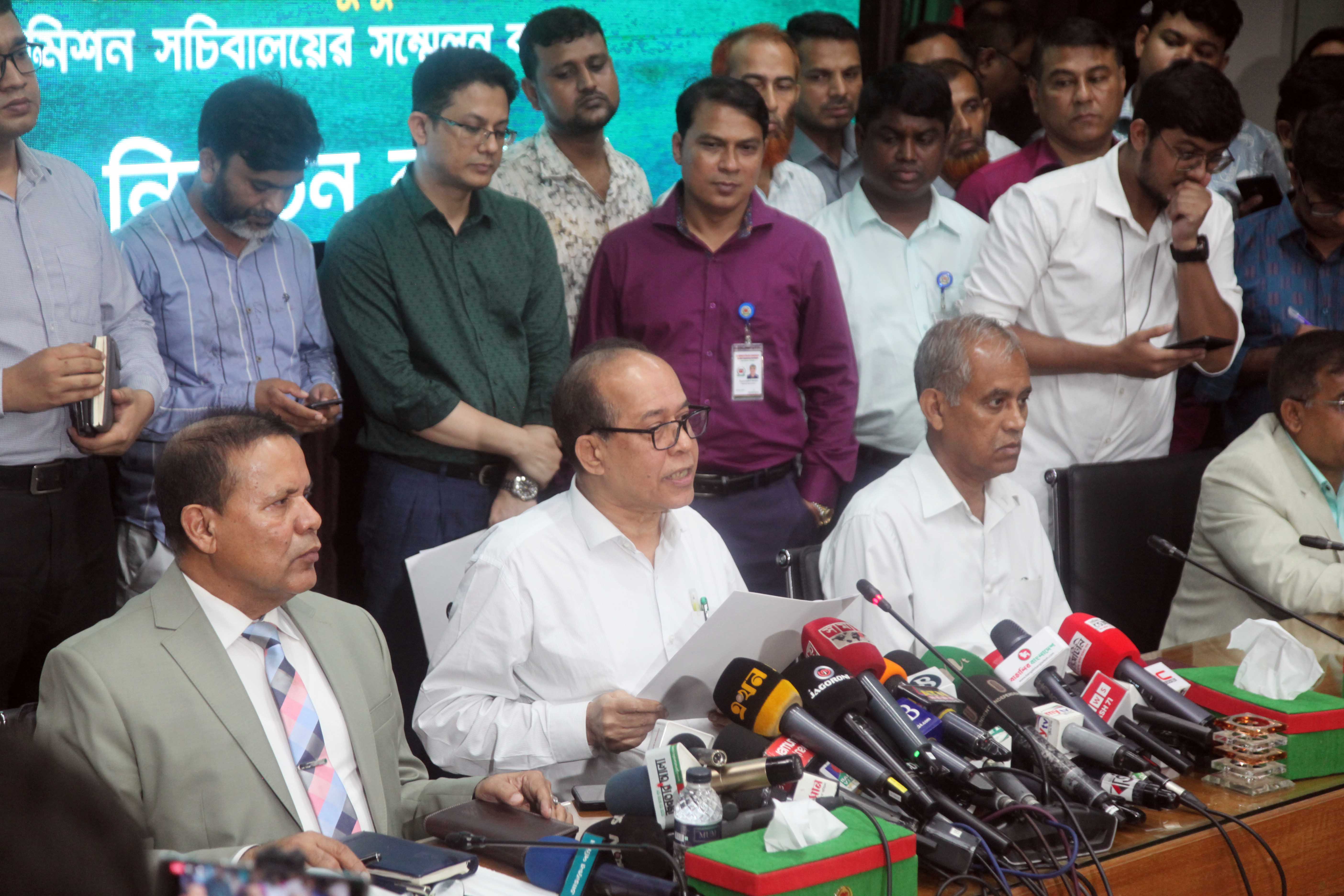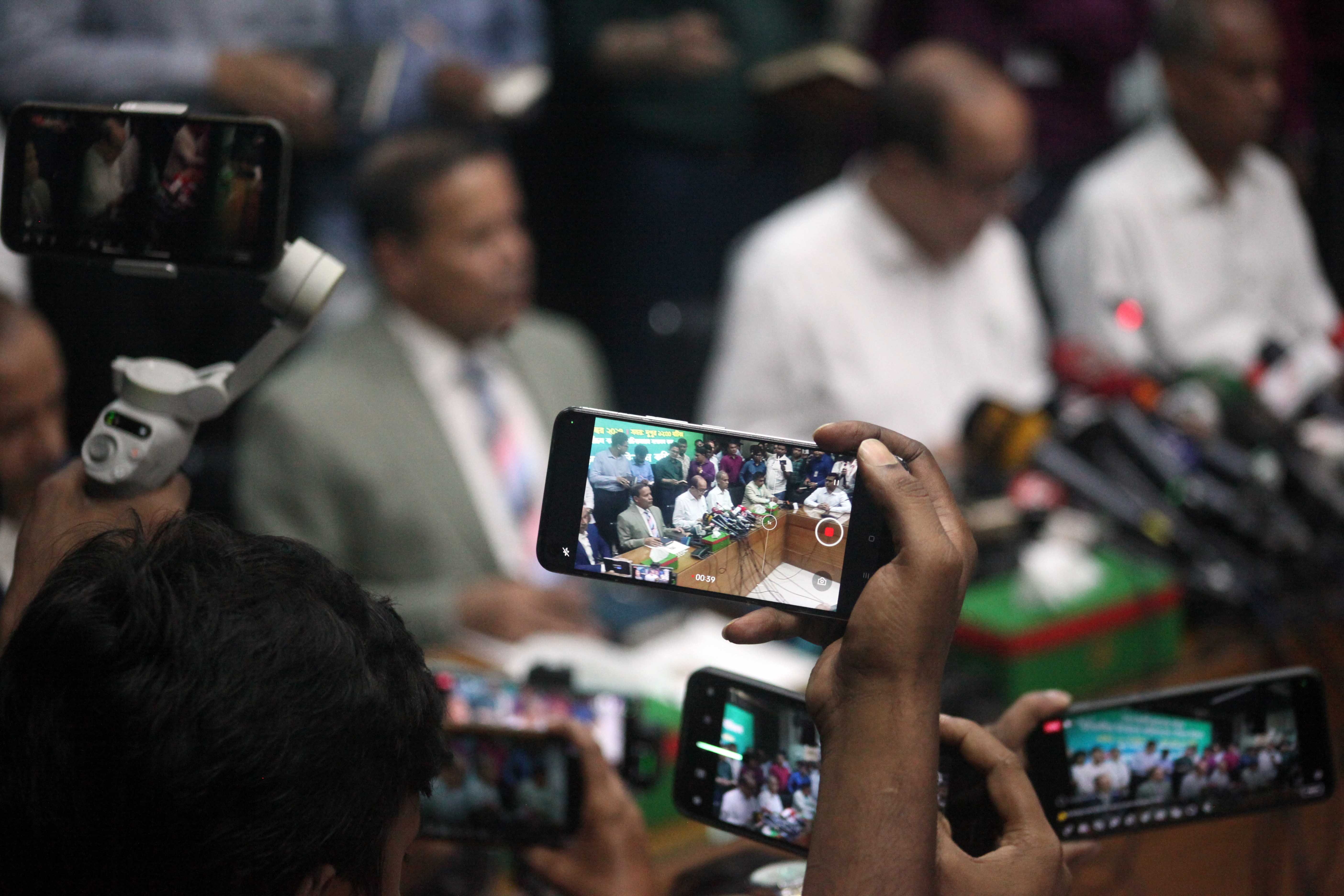Habibul Awal-led Election Commission resigns, paving the way for ‘reforms’
-66d9c052bb0ba.jpg)
Photo Credit: Nazmul Islam
The Election Commission, headed by Chief Election Commissioner Kazi Habibul Awal, has stepped down amid widespread reshuffles following the recent change in leadership.
The commission, which oversaw the 12th national parliamentary election, made the announcement at a press conference at Nirbachan Bhaban in Dhaka’s Agargaon on Thursday, two and a half years before their term was set to conclude.
President Md Shahabuddin has accepted the resignation letters of Awal and four other election commissioners, according to a statement from the Bangabhaban.
In addition to Awal, the four other commission members were retired Brigadier General Md Ahsan Habib Khan, retired district and sessions judge Rashida Sultana, and retired senior secretaries Md Alamgir and Md Anisur Rahman.
Former Chief Election Commissioner Awal previously served as the law secretary to the government, as well as in roles such as the religious affairs secretary, parliament secretariat secretary, and senior defense ministry secretary.
At the press conference, two of the commissioners—Brig Gen (retd) Md Ahsan Habib Khan, who had served on two commissions, and Md Alamgir—were present, while Rashida Sultana and Md Anisur Rahman were absent.
The Awal-led commission was inaugurated as the 13th in the country's history on February 27, 2022, and was responsible for organizing the general election held on January 7.
The media briefing by the Election Commission followed measures taken by the interim government to reform the constitutional body in response to a student-led mass uprising.
The election commission members had met previously on Wednesday.

Massive reshuffle of erstwhile Premier Hasina’s administration
The Sheikh Hasina government fell on August 5, leading President Mohammed Shahabuddin to dissolve the parliament.
In response to the mass movement, numerous leaders from the Awami League, including former Chief Justice Obaidul Hassan, have resigned. There have also been significant changes within the police and administration sectors.
On Tuesday, Parliament Speaker Shirin Sharmin Chaudhury also resigned.
In light of these developments, rumors of Chief Election Commissioner Awal’s resignation began circulating, and he has indicated his willingness to step down.
Reports indicate that the current commission has been attempting to meet with President Shahabuddin for a month without success. It remains uncertain whether a meeting is scheduled with the president on September 5.

Not for the first time
This situation is not unprecedented in Bangladesh. The Justice MA Aziz-led commission resigned after the military-backed caretaker government of Fakhruddin Ahmed assumed power following the declaration of a state of emergency on January 11, 2007.
Among the judges who served as Chief Election Commissioners, Md Idris, ATM Masud, and former bureaucrats MA Sayeed, ATM Shamsul Huda, Kazi Rakibuddin Ahmad, and KM Nurul Huda completed their five-year terms.
For a long time, there was no specific law governing the formation of the Election Commission in Bangladesh. Before the establishment of the new commission in 2022, a new law was suddenly introduced. Under this new legislation, Kazi Habibul Awal and four others took charge of the first commission.
It remains uncertain how long the current interim cabinet will remain in place or when the next election will be held. The parliamentary election will be conducted by a new constitutional body following the resignation of the Awal-led commission.
Awal has expressed his belief that it is his ‘duty’ to offer proposals for future consideration, based on his experience and understanding of both current and past circumstances.
He suggested that, given the ‘homogeneity’ of Bangladesh’s population, a numerically representative (party-based) election system might be ideal for the country. Additionally, he proposed that conducting the election in four or eight phases, with a 3-5 day break between each phase, could simplify management.
Awal also highlighted the outgoing commission’s initiative to accept nomination papers online and recommended increased use of technology in the election process.
He noted, “Furthermore, holding every general election under a non-partisan caretaker government could better achieve the intended objectives.”
—

